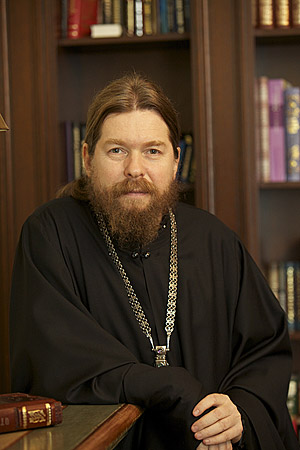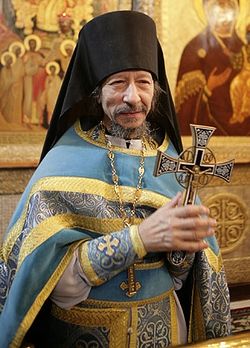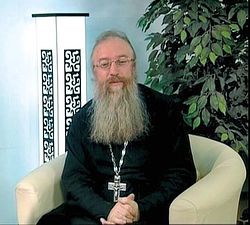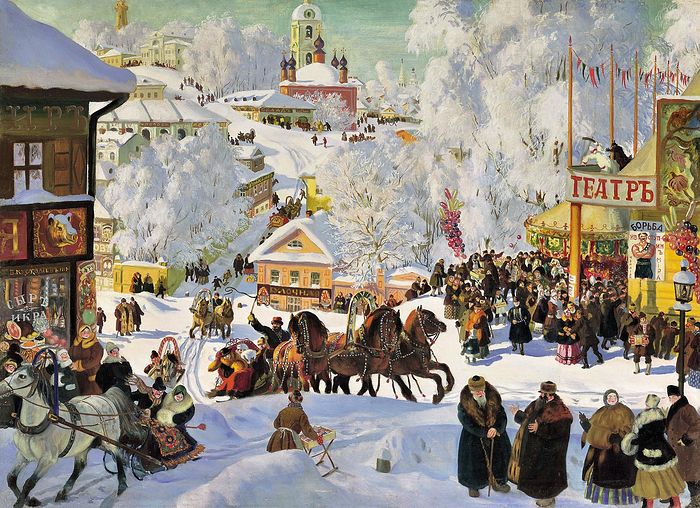It is the last week before the beginning of Great Lent—the week the Russians call "maslenitsa." In the West it is called "carnival," which had a similar meaning originally, but is now understood quite differently.
On the one hand, spring is in the air—it is a great time to visit friends and family, and have a good time. Of course, this often leads to gastronomical excesses, and perhaps too much to drink. In some places, the festivities can even take on a pagan aspect.
But on the other hand, this is the week in which we prepare ourselves for Great Lent. Our rations exclude meat, on Wednesday and Friday there is no Liturgy, and the repentant prayer of St. Ephraim the Syrian is read at the hours.
We asked some of our pastors what to do about this paradoxical situation. What is the meaning of maslenitsa, and how should an Orthodox Christian celebrate maslenitsa?
Archimandrite Tikhon (Shevkunov),
Father Superior of Sretensky Monastery, Moscow:

The festive table, pancakes—this is also not without meaning! The meaning of maslenitsa, of course, is not in the parties and rowdy behavior. This is obvious, and the Christian needs no explanation or boring reproach. The special meaning of maslenitsa as it was understood not so long ago, when there were no telephones or e-mail, was that people could have time during the week before Forgiveness Sunday and Great Lent to visit their close and distant relatives and friends and ask their forgiveness. Having made peace and forgiven each other, how could they not sit down to a feast? After all, we only recently heard the Gospel reading in church about Zaccheus, who repented, and then from the heart treated the Savior and all his friends to a nice meal. Or the parable of the prodigal son, the happiness of making peace and forgiveness: And bring hither the fatted calf, and kill it; and let us eat, and be merry: For this my son was dead, and is alive again; he was lost, and is found. And they began to be merry (Lk. 15:23–24). Only instead of the fatted calf, we have pancakes.
This is all so alive and understandable to every person, so natural, that honestly I am always a little amazed at the excessive moralization over maslenitsa these days. I am sure that for the majority of Orthodox Christians, the present week, which will include the pre-Lenten services on Wednesday and Friday, friendly social gatherings, forgiveness of offenses, and hospitable feasts, will all manifest that inimitable and joyful feast of a foretaste of, and preparation for Great Lent.
Hieromonk Job (Gumerov):

Because it is a preparation, cheese week excludes all excess of food. Its significance is contrary to gluttony and drunkenness. At the threshold of the quiet days of the Great Fast, the soul experiences a joyful uplifment, so that it can fully experience a repentant disposition. Already during cheese week, the wedding sacrament is no longer performed. On Wednesday and Friday Liturgy is not served, but there is no fast [other than from meat] on those days. At the hours, the prayer of St. Ephraim the Syrian is read with bended knee. On Sunday of this week, the Church remembers the casting out of our fore-parents from paradise for their disobedience and lack of restraint. "Let the world weep bitterly with our first ancestors: by sweet food they have fallen with the fallen one" (from the Synaxarion of Cheese-fare Sunday).
On Sunday evening, there is the rite of forgiveness, so that we might enter the fast at peace with all. This custom began with the ancient Egyptian desert dwellers, who gathered on the last day before the fast for common prayer. Having asked each other's forgiveness, they departed to solitary places in the vast desert and spent the Forty Days in great ascetical labors. The monastery gates were closed until Palm Sunday.
The custom in Russia of eating pancakes [in Russian blini—thin pancakes] during maslenitsa fully corresponds to Russian national piety. During these days, differences in social class, wealth, and official status were relaxed. People of lower classes, wanderers, and the poor were often invited to the table. "Now the holidays have lost their lustre, and people have as if grown cold. But then… Everyone was connected with me, and I was connected with everyone, from the poor old man in the kitchen who came in for a "poor man's pancake," to the unknown sleigh, dashing in the darkness with the ringing of its bell. And God in heaven, beyond the stars, looked lovingly at all—it's maslenitsa, have fun! A bright joy for me still lives in this magnanimous word" (Ivan Shmelov, Year of the Lord). Visiting each other for blini brought relatives closer together, and gave them a convenient opportunity to forget all injury and displeasure that may have built up over the year.
Cheese week ends with Forgiveness Sunday. That evening is the last opportunity to eat non-fasting foods before Great Lent.
Priest Alexy Darashevich (rector of the church of the Life-Giving Spring in Polenovo):

The Church is a living organism. When a person stands before the chalice of Christ he trembles from the understanding that he is not worthy, but at the same time he rejoices that he will now receive Communion. One is united with the other in an inconceivable manner. This is a testimony to authentic life in the Church. The Church is a living, amazing family with many individuals and voices. The Lord calls to all in it: "Repent, for the Kingdom of Heaven is at hand!" But He also says, "Rejoice!" There should definitely be both. There should be both inhalation and exhalation. But everything has its own time. It is wisely established that before Great Lent, before the strict first week, there is a time to "breathe the air," an opportunity (before remaining alone with your sins, before you begin the difficult ascent) to look around, meet with friends and family, and rejoice that they are near.
It is necessary during these days not to abandon prayer. Furthermore, the Gospels and Epistles should be read attentively. Going to church services also help us to find the right answer to the question, "how much fun may I have," to discover within our souls the limits of understanding this joy. If you cannot go often to church, then you can read the Gospels and Lenten Triodion—this will be useful for daily prayer and instruction.
The Church is truly vast, and there is room for everyone in it: for ascetics and strict fasters, but also for people who live in the world or who only go to church. Little children also need consolation and pleasantness. Adults—those who have already matured in Christ—seek quietude and concentration. The main thing is that both are penetrated with love for the Lord. Consolation can become unrestrained, consumerist, if it loses a sense of measure. This measure is the love of Christ. We repent when we look at His image, but we also rejoice to behold Him.


